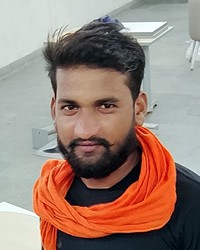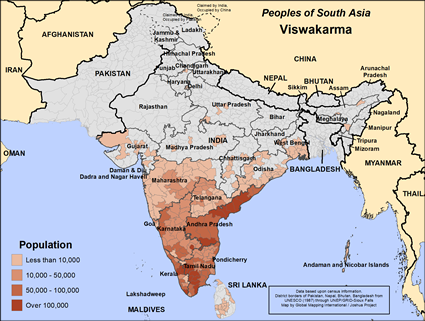Vishwakarma of India are also known as Vishwa Brahmin. They are followers of Vishvakarman, the Hindu presiding deity of all craftsman and architects, from whom all Vishwakarma claim to have descended. Hence, today the term Vishwarkama denotes a community or group of castes of artisans from India. These castes are the goldsmiths, carpenters, blacksmiths, copper-smiths, and stone-masons.
Their claim of Brahminism is based on their claims of lineage from the Hindu God, Vishvakarman who is believed to be the lord of creation. Also, they claim that it was the Vishvakarmas who are the real architects of the Indus Valley.
The Viswakarma made chariots for ancient kings. The Vishwakarma played a vital role in the Indian village economy where their communities are widely spread across the country. They considered themselves missionaries of civilization, culture and religion as they spread Hinduism through their arts and crafts. The Viswakarma have contributed greatly to Indian civilization and culture as city and temple builders, engineers, architects, and artists. In ancient India, Vishwa Brahmin were highly regarded. However, they are not as highly esteemed by the Brahmins, the priestly castes. The origin of this belief is largely unknown, but one reason was the refusal of Brahmins to recognize the status of the Vishwakarma to be at par with their own status. The Vishwakarma have also rejected the leadership and supremacy of the Brahmins and have set themselves up as Hindu spiritual guides and religious teachers.
The Viswakarma communal identity has always been strongly tied to their profession. With industrialization and more recently, globalization, the traditional artisan trade has been greatly affected. The economic and technological forces are bringing their traditional professions to extinction. This has contributed to a sort of identity crises, being unable to identify with the upper castes or the lower castes. They also have a rather unpopular history (until the 1980s) of identifying with the communists. Their socio-economic status varies from a very high level to the low level in different parts of India. The Viswakarma tend to earn high wages in cities because of their factory employment and lower wages in rural villages.
The Viswakarma claim of "Brahminism" is based on their lineage from the Hindu creator God, Vishvakarman. They worship and serve the gods of the Hindu pantheon. Hindus believe that by performing rituals and good works that they will attain "moksha" or freedom from the endless cycle of birth, death and rebirth. The Viswakarma visit Hindu temples and offer prayers, food, flowers, and incense to their gods in hopes of gaining protection and benefits. They do not have a personal or familial relationship with their gods as Christians do. There are many forms of Hinduism, each with its own deities and beliefs.
The main yearly holidays of the Viswakarma people are Holi, the festival of colors and the start of spring, Diwali, the festival of lights, Navratri, the celebration of autumn and Rama Navami, Rama's birthday.
The caste system divides Hindus into four main categories. The lowest communities are outside of the caste system.
The Viswakarma people need to put all their trust in Jesus Christ. He alone can provide them with the forgiveness of their sins and the hope of eternal life.
Pray for a spiritual hunger that will give the Vishwakarma a willingness to investigate the message of Jesus Christ.
Pray for a disciple making movement that will bless the Vishwakarma this decade.
Pray for the Lord to send out Indian believers to the Vishwakarma to tell them about Jesus.
Scripture Prayers for the Viswakarma unspecified in India.
| Profile Source: Keith Carey |











